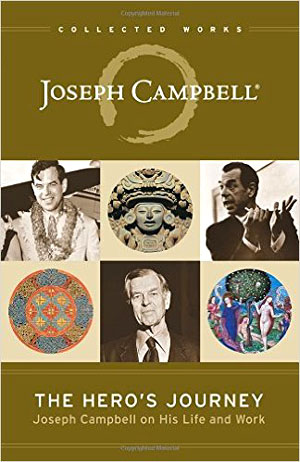 I’ve been reading Joseph Campbell’s books for decades, beginning with the massive, four volume The Masks of God in the late 1960s or 1970s. (I’m not sure what it says about me that I would jump right into a 2,000 page examination of the world’s mythology; I still have my copy).
I’ve been reading Joseph Campbell’s books for decades, beginning with the massive, four volume The Masks of God in the late 1960s or 1970s. (I’m not sure what it says about me that I would jump right into a 2,000 page examination of the world’s mythology; I still have my copy).
The Hero’s Journey, first published in 1990 and now appearing in a new, revised edition, is based on the film of the same name. It is something of biography of Joseph Campbell, not only of his life but of his thought, from his early fascination with American Indian culture to his study of the medieval Arthur Cycle to his encounter with the works of Indologist Heinrich Zimmer and, as a young man in Europe in the 1920s, with the work of James Joyce and Thomas Mann. It’s really a series of conversations with people as diverse as poet Robert Bly, anthropologist Angeles Arrien, filmmaker David Kennard, Doors drummer John Densmore, psychiatric pioneer Stanislov Grof, Nobel laureate Roger Guillemen, and others.
In a way, this book calls to mind not only The Hero With a Thousand Faces, Campbell’s synthesis of the world’s mythologies into the One Story, but also The Flight of the Wild Gander, in which he examined the workings of folklore, how it borrows, blends, and synthesizes the folk tales, iconic heroes, legends and stories of various peoples to come up with what each group considers its own folklore.
Campbell has elucidated the concepts of his own studies in mythography in a number of other works. What is fascinating here is the “first hand” view of how he arrived at them. In that light, the title is not arbitrarily chosen: the book is about the Quest, the Hero’s journey into enlightenment, in this case, Campbell’s own journey into understanding. Campbell quite explicitly makes the point that myth is metaphor; institutionalized religions have all too often lost the metaphor, and take their myth as literal truth. It’s his own search for the meanings behind the metaphor that makes this book so fascinating.
One thing I’ve always admired about Campbell’s writing is the clarity of his expression — he presents some pretty dense ideas with a simplicity that makes them easily apprehendible. This is a different order of creature: the richness is there, the almost instinctive grasp of relationships, the astounding erudition, but these are conversations — spontaneous, relatively unstructured, somewhat ad hoc. Sometimes the text is pretty dense.
The Hero’s Journey is really a history of the genesis of someone who became one of the twentieth century’s most important thinkers, and, considering the importance of “religion” in our public discourse these days, it’s a must read.
(New World Library, 2003) As of this writing, the film is still available on Vimeo.
